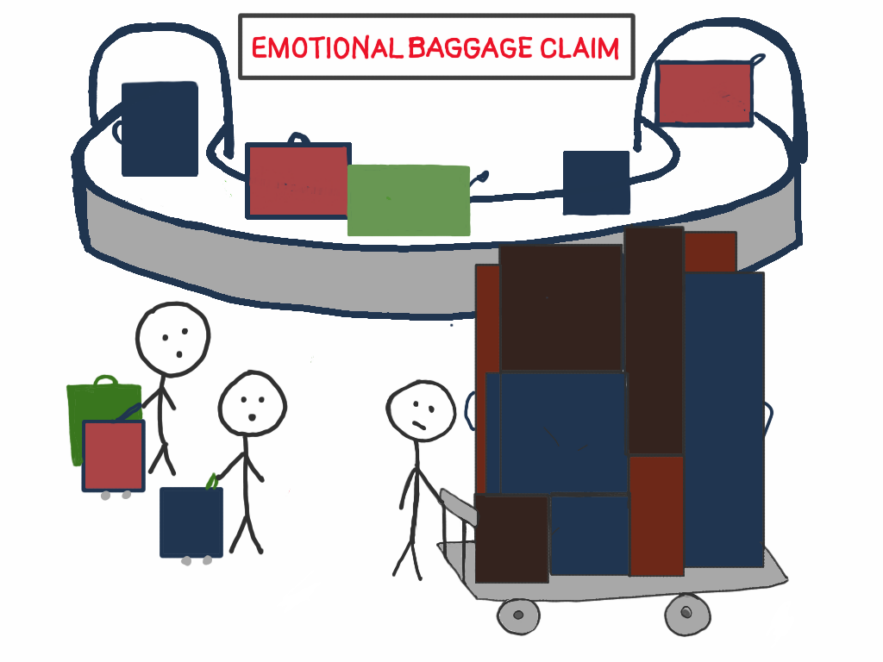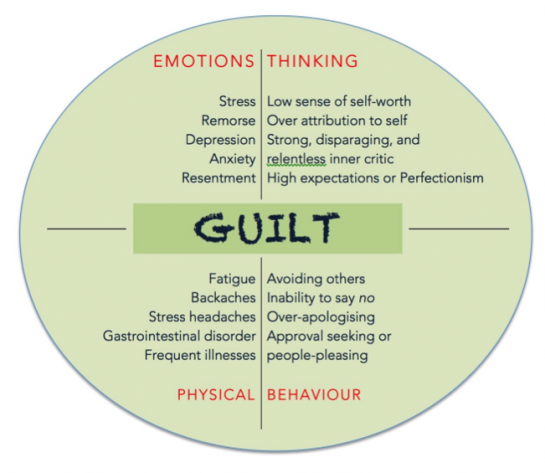PSYCHOLOGY OF US
YOUR RESOURCE LIBRARY
GUILT

To err is human; to admit it, superhuman. – Doug Larson
We are human. And no matter how hard we try, prepare, or concentrate on doing things right, mistakes are inevitable. Gigantic, messy, completely-our-fault mistakes that are very often pointed out to us by others. Yet we rarely talk about what to do when we feel guilty. When we are children, we may be taught to say I’m sorry, but what if I’m sorry isn’t enough? What if we can’t make amends? Or what if we can’t forgive ourselves?
We are human. And no matter how hard we try, prepare, or concentrate on doing things right, mistakes are inevitable. Gigantic, messy, completely-our-fault mistakes that are very often pointed out to us by others. Yet we rarely talk about what to do when we feel guilty. When we are children, we may be taught to say I’m sorry, but what if I’m sorry isn’t enough? What if we can’t make amends? Or what if we can’t forgive ourselves?
Or maybe we aren’t even sure why we feel guilty, guilt is just our default emotion. The following explains the upsides and downsides of guilt.
Contents:
Guilt and Shame are Different
Guilt Can Be Healthy
Unresolved Guilt Can Be Harmful
Guilt and Shame are Very Different
Often the terms are confused in the media but guilt and shame describe different emotional experiences. According to Shame and Grace author, Lewis B. Smedes, the difference between guilt and shame is very clear—in theory. We feel guilty for what we do. We feel shame for who we are. Guilt means I did something bad. Shame means I am bad.
We can feel guilty or ashamed (or both) about something we have done but guilt feelings tend to be healthier for us. Shame arises from negative self-beliefs and causes us to focus inwards. On the other hand, guilt arises from an awareness that we have caused others harm.
FIND OUT MORE: Shame.
When we feel guilty, our attention is focused towards the other party’s pain. As a result, we feel moderate pain, tension, and remorse. We believe that we have some control over our lives in general and we are able to take personal responsibility for our actions. We are motivated to repair damage and make amends.

Guilt Can Be Healthy
Feeling Guilty. The punitive feelings of guilt act as boundaries that guide us. Our internal guide helps us to maintain friendships, empathise with others, and be accepted by our chosen communities. Guilt motivates us to avoid causing harm and to rectify or apologise when we do. Guilt also promotes learning and mitigates regret. Learning a lesson can make meaning of past mistakes even when we can’t make amends.
Healthy guilt alerts us when we cheat on our diets, spend too much money, or hurt someone we care about. It motivates us to adjust our behaviour and usually dissipates shortly after we do so.
Guilting others. When we bring wrongdoing to our loved one’s attention, their guilt feelings motivate them to reaffirm their concern and their commitment to the relationship.
On a larger scale, compelling people to recognize the contradictions between what they value and what they do can influence social change. The speeches by Martin Luther King, Jr. that pointed out inequality during the US civil rights movement are examples.

Unresolved Guilt Can Be Harmful
Guilt feelings are common, healthy, and useful in short durations. However, when they linger passed their usefulness, guilt feelings can cause emotional distress and lead to more serious psychological issues. Below are some examples of unhealthy guilt and the toll that it can take on us.
Causes (origins) of Unhealthy Guilt
Unrelenting relational guilt. Lingering guilt often occurs when we hurt the ones we care about. When we are not skilled at rendering apologies or the harm that we caused is too great, the other party may be reluctant to forgive us. Or we may feel unable to forgive ourselves.
Guilt tripping. The difference between healthy guilt and a guilt trip may seem subtle but the two are very different. Healthy guilt may be induced by someone trying to influence our behaviour, whereas guilt-tripping occurs when someone tries to control our behaviour.
Healthy guilt arises when we point out the guilty party’s wrongdoing and we take responsibility for our own feelings, for example, When you are late, I feel that you don’t appreciate my time. Guilt tripping, on the other hand, aims to exert control by using:
- Exaggerations of responsibility and impact. I slaved over dinner for hours and now it’s ruined because of you.
- Condemnation of the person rather than the behaviour. You are so selfish.
- Demands rather than preferences. If you can’t be on time, don’t bother coming over.
- Punishment without room for forgiveness. I’m never cooking for you again.
Compassion fatigue. If we have been caring for someone, guilt may arise when we can’t provide all of the support that they want or need. We often think of professional helpers suffering from compassion fatigue but anyone who provides support to others can experience burnout.
Survivor guilt. Combat veterans or civilian survivors of war, trauma, or severe accidents can experience guilt that they faired better than others. Survivors may be consumed by, Why me? And they may feel responsible for the outcome in some way.
What often characterises survivor guilt is that it serves no purpose. There is no way to atone or apologise, which makes it difficult to put the guilt feelings behind us.
Separation guilt. We may feel intense guilt as a result of otherwise healthy choices that support our psychological needs and our autonomy. For example, when a student goes off to college leaving behind friends and siblings.
Disloyalty Guilt. Our pursuits may clash with family, religion, or community values. We may marry someone from another culture or love someone of the same sex. Others may feel betrayed and scorn or reject us as a result. Though we know that we haven’t done anything wrong, we may feel guilty nonetheless.
Overactive guilt. We may internalise the voice of an overcritical parent or influential person from our childhood. Often we have unrealistically high personal-expectations that we continuously fail to meet. Our inner critic is so strong and disparaging that we always feel guilty about something.
Guilt-proneness often causes us to over-analyse our past behaviour searching for offences. We routinely misinterpret events, assume responsibility for others misfortune, or exaggerate small mistakes. Rather than question our logic, we ruminate about our misgivings.
Impact of Unhealthy Guilt
Inability to reconnect. Psychologist Guy Winch suggests that unresolved guilt can limit our ability to reconnect with our loved ones in a meaningful way. When we feel unremitted guilt, we have a tendency to avoid others or become defensive, which can strain our relationships even more than the original offence. Other friends and family members may take sides, creating tensions and dividing their allegiances.
Resentment and avoidance. Though we may think of guilt trips as an innocuous persuasion tool employed in close relationships and families, it is a form of psychological manipulation.
Guilt tripping may get the desired outcome but it comes at a price. The guilted party often resents being manipulated and this resentment can build over time. Because guilt is an unpleasant emotion, the guilted party may avoid associated subjects, places, or contact with the guilt tripper altogether.
Diminished quality of life. Research suggests that guilt only makes us feel bad, it prevents us from feeling good.
We no longer permit ourselves to enjoy things and often feel guilty at the thought of having fun.
Self-loathing and shame. Unresolved guilt feelings can intensify and develop into shame and despair. We may begin to condemn our selves as well as our actions. Our inner critic may become an inner bully. Find out more about: Inner critics.
Self-destructive behaviour. To relieve our distress, we may punish ourselves. When we believe that we don’t deserve to be happy, we often sabotage our relationships, our careers, and ourselves. We may self-harm to relieve the distress or to atone for harm that we have caused others.
Anxiety and depression. Excessive guilt can be exhausting. It can drain our energy so much that we become stuck, unable to concentrate, or move forward. It can result in self-loathing, low self-worth, anxiety or depression.
Overactive guilt impacts our ability to function and inhibits our wellbeing. It can cause paralysing emotional distress and may be a sign of overactive anxiety. If this applies to you, you may need to seek help. FIND OUT MORE: Monkey therapy Can Help You Alleviate Anxiety.
Signs and Symptoms of Overactive Guilt
Are you constantly second guessing yourself? Does your guilt feel relentless, all-consuming, or paralysing?
Or maybe you beat yourself up with out even realizing it. Many times we have lived with guilt for so long, we may be unaware that it is there. It can drive our thoughts, our actions, and our emotions.

Excessive guilt may lead to psychological disorders if unaddressed but it may also be a symptom of other psychological issues: Clinical Depression, Bipolar disorder, or Anxiety disorders can affect our perceptions, causing us to negatively misinterpret our own behaviour.
References and Contributions
-
Lewis B. Smedes. (1993). Shame and Grace: Healing the Shame We Don’t Deserve.
-
Paul Gilbert. (2010). The Compassionate Mind.
-
K.L. Sommer & R.F. Baumeister. (1998). The construction of meaning from life events: empirical studies of personal narratives in P.T. Wong, and P.S. Fry. The Human Quest for Meaning.
-
Phil Barker. (2003). Guilt and Shame. Beyond Intractability.
-
Guy Winch. (2013). Emotional First Aid: Practical Strategies for Treating Failure, Rejection, Guilt, and Other Everyday Psychological Injuries.
-
Joseph LeDoux. (1996). The Emotional Brain.
-
Joseph LeDoux. (2015). Feelings: What are they and how does the brain make them? Daedalus.
-
Kelly McGonigal. (2015). The Upside of Stress: Why Stress Is Good for You, and How to Get Good at It.
-
Wendy Dryden. (2014). Shame and the Motivation to Change the Self. Emotion.
-
Karla McLaren. (2010). The Language of Emotions: What Your Feelings Are Trying to Tell You.
How therapy works
Worksheets and useful information
Creative Process
Feeling Stuck
Stress
Depression
Feeling Down
Anxiety
Guilt and shame
Find out more
What I do differently
Monkey Therapy
Transformational Coaching
Online Therapy
Trauma
Your inner critic
The science behind it
Steps you can take now
Publications
More than CBT
More than IFS
Psychedelics
Neurodiversity
Thank you!
Your message has been sent. We'll contact you shortly
© 2023 The Monkey Therapist. All Rights Reserved. Site Designed By Samantha Ósk
PRIVACY POLICY